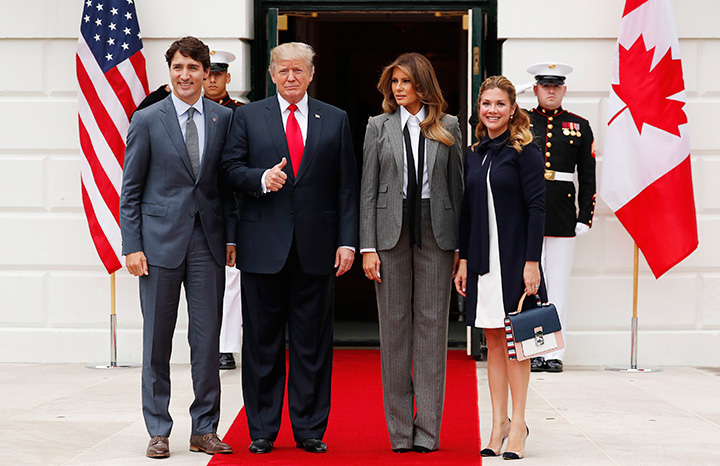For the first time, Prime Minister Justin Trudeau is acknowledging that the North American Free Trade Agreement could be in trouble.

Trudeau wrapped up his visit to Washington on Wednesday by saying that he continues to believe that renegotiating and renewing NAFTA is the best option for all three countries. However, he suggested – repeatedly – that the federal Liberal government is bracing for the worst.
READ MORE: Trudeau and Harper both talk NAFTA a few blocks away from each other in D.C.
“It is very important and very possible to get a win-win-win … out of these negotiations,” Trudeau told a news conference on the roof of the Canadian Embassy.
“So saying, I think it’s been clear that circumstances are often challenging, and we have to be ready for anything – and we are.
“We’re taking this very seriously and we’re taking the importance of standing up for Canadian jobs and Canadian economic growth very seriously, and that goes (for) every economic engagement we have with the Americans.”
During his earlier visit to the White House, Trudeau listened intently as U.S. President Donald Trump hinted at the possibility of a free trade deal directly with Canada, should the ongoing talks collapse.
But the U.S. president also said it’s too early to give up on the negotiations, which resumed Wednesday in Alexandria, Va., with negotiators from Canada, the U.S. and Mexico.

Get breaking National news
“It’s possible we won’t be able to reach a deal with one or the other,” Trump said, a poker-faced Trudeau seated at his side. “In the meantime, we’ll make a deal with one, but I think we have a chance to do something very creative that’s good for Canada, Mexico and the United States.”
It’s no secret that the president is not a fan of NAFTA, but Wednesday’s remarks suggested he’s open to the possibility of a bilateral trade deal with Canada. “We’ll see what happens, we have a tough negotiation.”
It wasn’t clear whether the change in the prime minister’s NAFTA message was a direct result of his meeting with the U.S. president, someone he acknowledged “makes decisions that surprise people sometimes.” But repeating the “ready for anything” sentiment multiple times suggests a conscious decision to acknowledge that the outcome of the talks may not go Canada’s way.
WATCH: Prime Minister Justin Trudeau is about to go on a mission to fight for Canadian jobs and sell free trade. David Akin has more on the PM’s trip to Washington and Mexico City.

“I continue to believe in NAFTA; I continue to believe that as a continent working together in complementary ways is better for our citizens and better for economic growth, and allows us to compete on a stronger footing with the global economy,” Trudeau said.
“So saying, we are ready for anything and we will continue to work diligently to protect Canadian interests, to stand up for jobs, and look for opportunities for Canadian business and citizens of all of our friends and neighbour countries to do well.”
Indeed, there have been early but unmistakable signs of trouble in the talks, with big business groups expressing fear the quarter-century-old deal could disappear.
Earlier Wednesday, Trudeau held discussions with the House of Representatives’ influential Ways and Means committee, one of two bodies of U.S. lawmakers that are helping negotiators put forward the U.S. positions on trade.
He joined the committee to warm applause and expressions of optimism about the deal from both the committee’s Republican chair and the ranking Democrat member.
The committee is dedicated to making sure the negotiations are successful, said Rep. Kevin Brady, the committee chair, who asked for Trudeau’s help in keeping an open mind.
“We all want this agreement to be a model for future trade deals,” Brady said.
The latest round of NAFTA talks kicked off with a discussion of government procurement, already a thorny subject – U.S. negotiators suggested during the last round in Ottawa that they want to limit Canadian and Mexican access to U.S. projects.
From there, discussions are scheduled to move onto developing remedies for trade disputes, as well as the contentious issue of agriculture.















Comments
Want to discuss? Please read our Commenting Policy first.